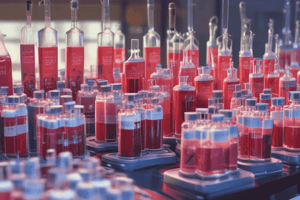Podcast
Questions and Answers
Where is the MLT 82 Final Lecture Exam taking place?
Where is the MLT 82 Final Lecture Exam taking place?
Room G102
What is the total number of questions on the MLT 82 Final Lecture Exam?
What is the total number of questions on the MLT 82 Final Lecture Exam?
116
What chapters of the textbook does the MLT 82 Final Lecture Exam cover?
What chapters of the textbook does the MLT 82 Final Lecture Exam cover?
Chapters 23 to 43
The MLT 82 Final Lecture Exam covers topics related to basic Hematology.
The MLT 82 Final Lecture Exam covers topics related to basic Hematology.
The MLT 82 Final Lecture Exam includes questions about Learning Objectives from past quizzes.
The MLT 82 Final Lecture Exam includes questions about Learning Objectives from past quizzes.
Students should bring a calculator to the MLT 82 Final Lecture Exam.
Students should bring a calculator to the MLT 82 Final Lecture Exam.
What are the main steps involved in processing Hematology and coagulation specimens?
What are the main steps involved in processing Hematology and coagulation specimens?
What does departmental quality control involve in Hematology and Coagulation testing?
What does departmental quality control involve in Hematology and Coagulation testing?
What type of equipment is essential for maintaining Hematology and coagulation specimens?
What type of equipment is essential for maintaining Hematology and coagulation specimens?
What is the primary role of basic scientific principles when learning new techniques and procedures?
What is the primary role of basic scientific principles when learning new techniques and procedures?
How are hematological lab findings used in diagnosing diseases?
How are hematological lab findings used in diagnosing diseases?
What are the steps involved in analyzing patient clinical and laboratory findings?
What are the steps involved in analyzing patient clinical and laboratory findings?
What is the primary goal when determining whether Hematology and coagulation results fall within normal reference ranges?
What is the primary goal when determining whether Hematology and coagulation results fall within normal reference ranges?
What are the critical factors that affect Hematology and coagulation procedures and results?
What are the critical factors that affect Hematology and coagulation procedures and results?
What action should be taken when corrections are indicated in Hematology and coagulation procedures and results?
What action should be taken when corrections are indicated in Hematology and coagulation procedures and results?
What are the essential components for demonstrating professional conduct in the healthcare setting?
What are the essential components for demonstrating professional conduct in the healthcare setting?
How is continuing education essential for maintaining competency in the healthcare field?
How is continuing education essential for maintaining competency in the healthcare field?
Flashcards
What is Hematology?
What is Hematology?
Hematology deals with the study of blood, its components, and their role in health and disease.
What is Coagulation?
What is Coagulation?
Coagulation refers to the process of blood clotting, which helps stop bleeding.
What does the MLT 82 final exam cover?
What does the MLT 82 final exam cover?
MLT 82 final exam covers material from Chapters 23 to 43, Chapters 1 to 3 of the textbook, basic hematology, and coagulation concepts.
What is the format of the MLT 82 final exam?
What is the format of the MLT 82 final exam?
Signup and view all the flashcards
When and where is the MLT 82 final exam?
When and where is the MLT 82 final exam?
Signup and view all the flashcards
Why is analyzing reference ranges important in hematology and coagulation?
Why is analyzing reference ranges important in hematology and coagulation?
Signup and view all the flashcards
What factors affect hematology and coagulation procedures?
What factors affect hematology and coagulation procedures?
Signup and view all the flashcards
Why is identifying errors in hematology and coagulation procedures important?
Why is identifying errors in hematology and coagulation procedures important?
Signup and view all the flashcards
What key tasks are involved in hematology and coagulation procedures?
What key tasks are involved in hematology and coagulation procedures?
Signup and view all the flashcards
Why is quality control essential in hematology and coagulation?
Why is quality control essential in hematology and coagulation?
Signup and view all the flashcards
What are the key steps involved in performing hematology and coagulation tests?
What are the key steps involved in performing hematology and coagulation tests?
Signup and view all the flashcards
Why are scientific principles important in hematology and coagulation?
Why are scientific principles important in hematology and coagulation?
Signup and view all the flashcards
How do hematological lab findings aid in disease diagnosis?
How do hematological lab findings aid in disease diagnosis?
Signup and view all the flashcards
Why are professional conduct and communication skills important for lab professionals?
Why are professional conduct and communication skills important for lab professionals?
Signup and view all the flashcards
Why is continuing education important for lab professionals?
Why is continuing education important for lab professionals?
Signup and view all the flashcards
Why is a calculator important during the MLT 82 final exam?
Why is a calculator important during the MLT 82 final exam?
Signup and view all the flashcards
What are the common final questions focusing on?
What are the common final questions focusing on?
Signup and view all the flashcards
Why are basic hematology and coagulation concepts important?
Why are basic hematology and coagulation concepts important?
Signup and view all the flashcards
How can past quizzes help prepare for the final exam?
How can past quizzes help prepare for the final exam?
Signup and view all the flashcards
Study Notes
MLT 82 Final Exam - 2024 Fall
- Date: Wednesday, 12/18/2024
- Time: 6:00 PM to 8:00 PM
- Location: Room G102
- Exam Format: 100 multiple choice questions, 16 common final questions, covering chapters 23-43 of the textbook and parts of chapters 1-3, addressing potential gaps from previous quizzes, similar to previous tests, calculator required.
Common Final Questions Learning Objectives
- Specimen Handling & Analysis: Collect, process, analyze, and report hematology and coagulation specimens following written lab procedures; perform and monitor routine departmental quality control.
- Quality Control & Problem Solving: Perform and interpret Hematology and coagulation tests; maintain quality control within established guidelines; apply problem solving techniques.
- Equipment and Techniques: Perform, interpret, and report Hematology and coagulation specimens while maintaining and learning new techniques with automated laboratory equipment; apply basic scientific principles in procedures.
- Clinical Application: Relate hematological lab findings to common disease processes and aid physicians in testing and diagnosis; analyze clinical, and lab findings to determine if hematology/coagulation results are within the normal range.
- Pre-Analytic, Analytic, and Post-Analytic Factors: Recognize pre-analytical, analytical, and post-analytic factors affecting hematology and coagulation tests; appropriately analyze results within predetermined limits and take correction actions when indicated.
- Professional Conduct and Communication: Demonstrate professional conduct and interpersonal communication skills with patients, lab personnel, other health care professionals, and the public.
- Continuing Education: Maintain and establish continuing education and professional competence through ongoing learning.
Studying That Suits You
Use AI to generate personalized quizzes and flashcards to suit your learning preferences.




